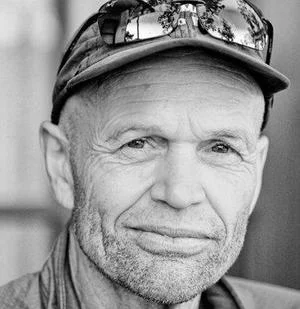This is one of the wonderful stories Micah originally wrote on his site caballoblanco.com.
By Micah True
In a small Ranchito called 'Los Alisos' lived an octogenarian couple named Señor and Señora Torres.
"Corazon, you are my left arm", he told her. "And you, you are my right", she said.
It had been a long time that they had been together, either remembering a time when they were not.
"They say the world is changing", he said. "Oh, is it?..... I love you".
It had been many, many years since they had sex. Yet, they made love every moment of every day and night. With a mischievous twinkle in her eye, she said,
"Remember when we made love the very first time, under this tree, this 'alisos', so many years ago?"
And the alder had lived a full life, tall, wide and strong; it's presence and strong spirit watching over them and their rancho. Daily, they would visit this ancient spirit, spending time together in the comfort of it's friendly familiarity, like the relation that it was. And other relations, la familia del pajaros azules [blue birds] would visit, feeding on the kernels of maiz that she would leave out for them daily.
The Torres clan had laid claim to this little piece of property in the lush arroyo 'Los Alisos', that is one of the many side canyons of La Sierra Madre, running like so many winding arteries into the heart of the 6,000 foot depths of the mighty Urique canyon in the Copper Canyon region of Mexico. The family had resided in this arroyo paradise since Mexican miners had discovered silver in the canyons, oh, many generations back. And what remained among the alders, the sister sycamores, the ruined adobe structures of a past thriving settlement, was the old couple and their ranchito, along with an orchard of giant toronjos [grapefruit trees] that produced the most grande, ripened on the tree, sweetest grapefruits that one would ever experience.
The Torres family had no money; they did not need money; they were rich, having each-other, the company of the alders, sycamores, los pajaros azules, giant grapefruit trees, their garden, plots of corn and beans. What more was there?
Sometimes, a 'gringo' hiker would pass the rancho, wandering the canyon country, dehydrated and disoriented. 'Los Alisos' would seem like a mirage, an oasis with her lush bounty of fruit and fresh spring water. These encounters also provided wonderful entertainment for the old couple, and a chance to extend hospitality, to hear stories of other places while sharing of their now vanishing world.
The old man knew every little goat trail and shortcut that there was in la sierra, and could climb like a goat, leaving young hiking travelers in the dust, their tongues hanging out; this was good fun.
The old man had just escorted some exhausted, disoriented young hikers to the rim of the canyon, bid them 'que le vaya bien', and continued his walk to another rancho even higher in la sierra, where he was to examine a couple of burros that were for sale. The acquisition of these animals would make life easier for his amor verdad [true love], who cooked over a wood fire, daily gathering the wood fuel, grinding the corn by hand for the fresh, whole grain and hand patted tortillas gordos [fat ones].
He had been gone, walking and visiting, for a couple of days, and on his way back to Alisos. Old man Torres stood on a rock overlook, taking in the incredible views of the grand canyon, that in all these years, he had never lost his awe and appreciation of, in all it's beauty, no matter how many times that he had gazed upon her; like his wife; like La Sierra Madre [the mother mountains], that in his heart, was a metaphor for his beloved one. They were all connected.
He was now walking on a soft, high mountain trail that was covered with pine needles, gradually descending into oak trees that had huge leaves like elephant ears, that when dry, would fall to the ground, covering the trail, rendering it invisible but for the rocks and the leaves that would make a loud crunching sound when walked on. This loud crunch of the leaves in the calm silence of la sierra, would announce the approach of on-coming people or animals from a great distance.
The ol' timer reflected on how this year, something strange had been occurring; the pajaros had been dying; and his favorite horse had suddenly taken ill and died from some mysterious ailment. The people had said that a new virus had arrived from 'el otro lado' [the other side]; and was being passed on, carried by mosquitoes.
It was while eating a lunch of maiz tortillas and frijoles, that he suddenly felt a sharp pain in his left arm, his heart fluttering. The octogenarian was up and running; gracefully springing from the firmly planted rocks that he called 'ayudantes' [helpers], avoiding the smaller, fist sized rocks that could trip one up; these he called 'chingocitos' [little fuckers]. He was moving like a runner many years younger; he just knew that he had to get back to his amor.
Upon arrival at the ranchito, he found his love in a weakened state, shaking from fever, unable to move. He cradled her in his arms all night, nursing her with warm tea and grapefruit juice, kissing her, telling her he loved her.
In the morning, she opened her eyes and with a smile on her face, asked to be buried under the old Alisos where they had first made love;
"and do not forget to feed los pajaros azules."
Then, she passed. The old man buried his beloved where she had asked, then planted yet another young alder on top of the mound of earth that was her grave. He made the sign of the cross, then spread a couple handfuls of maiz kernels on the ground, welcoming the blue-birds as they fed; the old timer knowing that their spirits would be here, together always. What better place to be?


